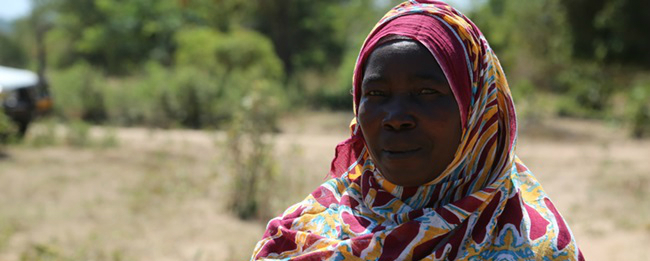Oxfam Scotland has warmly welcomed First Minister Nicola Sturgeon’s pledge to increase investment in the Scottish Government’s Climate Justice Fund to £12 million over the next four years to help developing countries deal with the impact of climate change.
The pledge comes as the UN global climate change summit in Paris – know as COP21 – enters a critical phase with a strong deal on emission reduction and climate finance vital. [1]
Climate change is leading to more frequent and severe droughts, floods and other climate extremes and Oxfam’s work with smallholder farmers – particularly women – in developing countries shows they are perilously exposed to climate impacts.
Head of Oxfam Scotland Jamie Livingstone said: “We know climate change is already making the daily lives of the world’s poorest women, men and children even harder and it is the single biggest threat to winning the fight against hunger.
“Globally, and here in Scotland, we must limit the damage by reducing emissions, but we must also ramp up our support to help those already affected adapt their lives to unavoidable climate impacts.
“In this context, the Scottish Government’s enhanced commitment to climate justice is very welcome – it increases the funding promised and creates much needed predictability.
“Despite global promises to increase levels of climate finance the money has been slow in coming forward and adaptation finance has consistently been neglected.
“By pledging to increase Scotland’s Climate Justice Fund – which is additional to the International Development Fund – Scotland is showing crucial leadership during the Paris talks.”
Since it was established in 2012, Scotland’s Climate Justice Fund – which has attracted vital cross party support – has improved the lives of some of those worst affected by climate change, including by funding Oxfam’s climate justice project in Zambia. [2]
Climate adaptation projects support people to cope through measures such as: improving small-scale irrigation systems, paying for drought resistant crops, training small-holder farmers in new planting techniques, and raising the level of homes above flood levels. [3] [4]
Oxfam International Executive Director Winnie Byanyima said: “Within Oxfam, we see climate change as a crisis of inequality, where poor and vulnerable people – and especially the women of the South – are shouldering hugely disproportionate risks.
“Ultimately, the test of the Paris talks rest on whether they are a game-changer for those most affected. Their voices must be heard clearly, and to mean something, the deal must work for them.”
Last week Oxfam released new research – “Extreme Carbon Inequality” – showing the poorest half of the world’s population – 3.5 billion people – is responsible for just 10 percent of carbon emissions, despite being the most threatened by climate change. In contrast, the world’s richest 10 percent of people produce around half of all emissions. [4]
Alongside increased climate finance, it is essential the global talks ensure the goal of keeping global temperature rises below 1.5°C, or even 2°C, stays within reach.
Jamie Livingstone added: “Today’s Scottish Government pledge must be part of a concerted effort in Scotland and across the world to reduce emissions and continue to grow climate finance in the years ahead.
“By promising this additional finance, Scotland is showing real leadership and can credibly call on others to increase their climate finance during the Paris talks.”
In October, Oxfam Scotland launched a report – “Even It Up: Scotland’s Role in Tackling Poverty by Reducing Inequality at Home and Abroad“. It called on all parties at the Scottish Parliament to commit to immediately increasing the Climate Justice Fund to £3 million per year, and gradually growing its value to match the International Development Fund by the end of the next Parliament.
The paper also called on all parties to outline a credible, fully-costed and transparent plan to deliver Scotland’s emission reduction targets within the Climate Change (Scotland) Act 2009.
For more information contact Lisa Stewart on 0141 285 8874 or LStewart1@Oxfam.org.uk.
Notes to Editors
[1] Oxfam Media Briefing: “Game-Changers in the Paris Climate Deal: What is needed to ensure a new agreement helps those on the front lines of climate change” – https://oxf.am/Ze42.
[2] Zambia Climate Justice Initiative information (2012-2015):
The project aims to develop and promote climate resilient livelihoods among small scale farmers and households by promoting natural resources management techniques and community led strategies and increasing levels of preparedness by developing an information base in the community which will allow farmers to better understand hydrological changes. The wider community is also reached via a series of school debates and radio programmes focussed on water management and other elements of natural resource management.
[3] Challenging climate change in Tanzania – short film: https://oxf.am/Zmh4.
[4] Oxfam International’s “Extreme Carbon Inequality” report – https://oxf.am/ZeA7.
[5] Oxfam Scotland’s report: “Even It Up: Scotland’s Role in Tackling Poverty by Reducing Inequality at Home and Abroad” – https://oxf.am/ZmnR
ENDS
